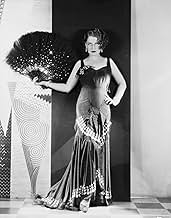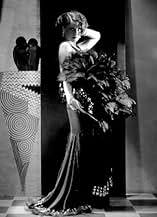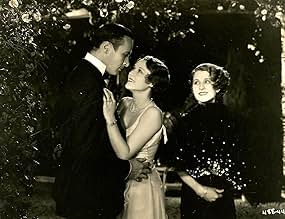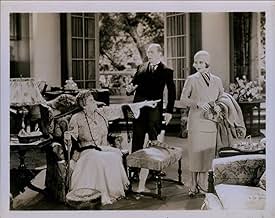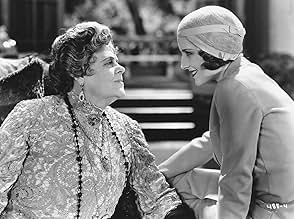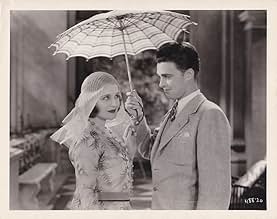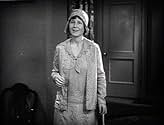Aggiungi una trama nella tua linguaA housewife divorces her self-centered husband. Years later, she attends a party where her ex is pursuing another woman. Unbeknownst to him, she is the same ex-wife he'd neglected, now trans... Leggi tuttoA housewife divorces her self-centered husband. Years later, she attends a party where her ex is pursuing another woman. Unbeknownst to him, she is the same ex-wife he'd neglected, now transformed into a fashionable socialite.A housewife divorces her self-centered husband. Years later, she attends a party where her ex is pursuing another woman. Unbeknownst to him, she is the same ex-wife he'd neglected, now transformed into a fashionable socialite.
- Regia
- Sceneggiatura
- Star
- Premi
- 1 vittoria in totale
- Bob Brown
- (as Rod LaRocque)
- Wallace
- (as Tyrrell Davis)
- Struthers
- (as William O'Brien)
- Bobby Brown - 8 Years Old
- (non citato nei titoli originali)
- Mrs. McIntyre
- (non citato nei titoli originali)
- The Brown's Little Girl
- (non citato nei titoli originali)
- Helen Hibbard
- (non citato nei titoli originali)
- Bobby Brown - 5 Years Old
- (non citato nei titoli originali)
Recensioni in evidenza
Also appearing are Hedda Hopper as the beautiful Madge Livingston and Dickie Moore as Katherine's young son.
This film suffers a bit from early talkie syndrome. The editing is not as slick as it could be, with moments of complete silence and shots with no people in the frame. Sometimes the scenes are confined to one room with very little editing between people. The story is also quite old fashioned, especially the abrupt ending which does not comply with the rest of the film. However, it is worth watching especially for Shearer fans. It is fascinating to see such a startling transformation from an overweight housewife to a gorgeous and elegant woman.
Norma Shearer was pregnant when this film was made, so MGM hurried its shooting - completing it in less than a month. The story is based on a play by American playwright Rachel Crothers. In places, it is melodrama, and in some others, it's silly or sappy. It's a classic use of innuendo regarding morals and loose living. And, it's a picture of marriage, infidelity and tested love. The setting for all of this is in the upper crust of society. One wonders how audiences received this film in the first year of the Great Depression.
The film has much humor - biting in places. The cynicism contributes to some hilarious scenes in which the players crack up among themselves. Those seem to be impromptu and authentic, and one wonders if they didn't happen that way on the set and the director decided to keep them instead of reshooting scenes. They give a sense of reality as something that happens among people in regular life, but that one seldom sees in scripted movies.
Most of the cast do well with one exception. Rod La Rocque is very wooden as Bob Brown. His voice especially seems to be that of a monotone robot. This is so obvious as to be nagging and distracting from any sincerity on his part. This is an instance when one role so affects the whole film negatively. La Rocque looked the part but just didn't or couldn't play it. Any number of other actors of the day would have been suited for that role.
Norma Shearer is Kitty Brown, whose makeup transformation is quite remarkable. Marie Dressler is Mrs. Bouccicault - Bouccy (pronounced, "Boo-see") as Kitty and others call her by nickname. She and Kitty dominate most of the scenes they are in together. Dressler truly was one of the greats of early cinema. Gilbert Emery is superb as Towney Townley, a carefree wealthy middle-aged bachelor who is smitten with Kitty. Hedda Hopper is a hoot as the very exaggerated stuffy and snobbish Madge Livingston. And, Tryrell Davis is very good and funny as the cowering Wallace Granger. Even the main butler and maid contribute to the humor in this film. The rest of the cast are fine
The best part of the film is the witty and cynical comedy in exchanges between Kitty and others, especially Bouccy and Towney. The plot is unique and good, and it has a different but nice ending for a Hollywood production even then. It reflects the undertone of true love, not just romance between a couple.
Here are some favorite lines from the film. For more witty and other dialog, see the Quotes section under this IMDb Web page of the movie.
Mrs. Bouccicault, "Towney, this is Mrs. Cortland-Brown. She's not as sweet as she looks. But, you'll think she is." Towney Townley, "How do you do. I am nicer than I look - much." Kitty Brown, "How could you be?"
Kitty Brown, "How do you do. Oh, you magnificent long-legged Britisher. I've been avoiding you in Paris. But you are wonderful, aren't you?" Towney Townley, "Yes, yes, we, we are, aren't we?" Kitty Brown, "I thought you said he was 'umble." Mrs. Bouccicault, "Hmm, hmm. This isn't the one." Kitty Brown, "Oh! You mean to say I have to say that all over again? Because that's the way I'm gonna begin."
Towney Townley, "Uh, begin what?" Kitty Brown, "Well, you see, uh, Bouccy has a certainly laid plan whereby I have to get a man. Now, would, uh, would that get you?" Towney Townley, "I don't remember what you said, but you have got me." Kitty Brown, "Oh, I like this one. Bouccy, make it this one." Bouccy, "All right, practice on him." Towney, "She doesn't seem to need practice."
Kitty Brown, "You must be a very smart person." Towney Townley, "You found me out."
Kitty Brown, starting a bridge game, "Who's going to pay my losses?" Towney Townley, "I shall be delighted. I love to have beautiful women under obligation to me."
Mrs. Bouccicault, "When you quote me, make it agreeable." Kitty Brown, "No one would believe you said it, lamb." Towney Townley, "One on you, my pet."
Mrs. Bouccicault, while a group is singing around Kitty at the piano, "Towney, is that you making that particularly bad noise?" Towney Townley, "No. I'm making the tenor." Bouccy, "Well, stop it." Kitty Brown, "Don't stop. You make the rest of us sound so good."
Towney Townley, "Kitty, you have the prettiest ears I ever saw. I wanted to kiss the right one all through dinner, especially with the salad." Whitman - 1st Butler, "Oh, Perkins. Mrs. Brown is leaving on the 11 o'clock train. It might be as well for you to assist her." Perkins, "That's just where I'm going, and without any suggestions from you."
Kitty (Norma Shearer) is a somewhat overweight frumpy housefrau, devoted to her husband and kids. The husband, Bob (Rod La Roque), is kind to Kitty, but his passion belongs to his mistress. The mistress is getting tired of hiding matters, so she barges into the house and frankly tells Kitty what's been going on between the two of them. Kitty acts sophisticated and says she knows all about it, but deep down she is heartbroken. Bob asks for forgiveness and a second chance, but she flatly refuses.
Fast forward three years and socialite Mrs. Bouccicault (Marie Dressler) is entertaining at her Long Island estate. She's invited her good friend Kitty to come for the weekend and steal Bob away from her granddaughter, Diane (Sally Eiler), who is about to be married to someone closer to her own age and range of experience. Mrs. B has no idea that Kitty was ever married to Bob, so this is just a big coincidence. Kitty is now thin, fashionable, and confident and has no idea that she is supposed to be vamping her ex husband. Just how this transformation to head turner happened is never mentioned. For that matter, neither are her children! Well, they are alluded to from time to time, but they apparently are stashed somewhere that they cannot interfere with the jet setting of their parents before there was any such thing as jets.
When Kitty and Bob finally meet, they are genuinely surprised to see each other and sparks begin to fly. In Bob's case that means romance is on his mind, but in Kitty's case those sparks could mean she is considering burning him at the stake. How does this turn out? Watch and find out.
I don't know who cast the men in this film, but they are ponderous choices. Collectively they have the romantic appeal of the Pillsbury Doughboy without his flair for conversation and comedy. I will give it a small break because this was the first full year MGM was involved in talking film. The first act with Kitty as a frump and the last act are compelling, but it sags pretty badly in the middle and is mainly saved by Marie Dressler's performance as the eccentric socialite Mrs. B. Dressler steals the show in just about every scene she appears, as was often the case.
Three years later, Shearer is a glamorous and flirty divorcée. While summering in Paris, she has struck up a friendship with wealthy, older socialite Marie Dressler (as Mrs. "Boucci" Bouccicault). Ms. Dressler invites Shearer to her Long Island home, to socialize with some friends, and ask a favor. Dressler is worried about her granddaughter's relationship with a suave, worldly man. She wants young Sally Eilers (as Dionne) to marry Raymond Hackett (as Bruce), instead. Aware of Shearer's flirtatious conquests, Dressler asks her to lure the undesirable man away from Ms. Eilers. Shearer is stunned to discover the man is La Rocque, her ex-husband.
Shearer and Dressler make this a cute, entertaining play. They are in top form, giving guaranteed-to-be-popular performances, with enthusiasm and professionalism. The story is silly and predictable; yet, in a way which helps the humorous situation. And, the ending is quite clever. In fact, the comic "Let Us be Gay" may have aged better than Shearer's larger-produced, and more serious, "The Divorcée", which was released around the same time. The cast uniformly fine. La Rocque is better than his film with Lillian Gish; but, his role is not at all endearing. Gilbert Emery (as Towney) and Tyrell Davis (as Wallace) are funny supporting suitors.
Those not familiar with Norma Shearer may not realize it is she who appears as the dowdy wife in the opening scenes. This is Shearer as "Kitty" before her make-over. Watch the close-ups of Shearer with light, natural make-up, for a good look at an intriguingly beautiful woman.
******* Let Us Be Gay (1930) Robert Z. Leonard ~ Norma Shearer, Marie Dressler, Rod La Rocque
Lo sapevi?
- QuizAt the time of its release, this film features the next two actresses to win Best Actress at the Academy Awards, Norma Shearer would win at the ceremony later that year for La divorziata (1930), and Marie Dressler the year after for Castigo (1930).
- BlooperNear the end of the film, just after the children depart with Boucci and their nurse, a shadow of the boom microphone falls across a column to the right of the scene.
- Citazioni
Mrs. Katherine Brown: For Heaven's sake, let's be gay about this!
- ConnessioniAlternate-language version of Soyons gais (1930)
- Colonne sonoreOh Where Oh Where Has My Little Dog Gone
(1864) (uncredited)
Written by Septimus Winner
Sung a cappella by Rod La Rocque with modified lyrics
I più visti
- How long is Let Us Be Gay?Powered by Alexa
Dettagli
- Data di uscita
- Paese di origine
- Lingua
- Celebre anche come
- Let Us Be Gay
- Luoghi delle riprese
- Azienda produttrice
- Vedi altri crediti dell’azienda su IMDbPro
- Tempo di esecuzione1 ora 19 minuti
- Colore
Contribuisci a questa pagina


